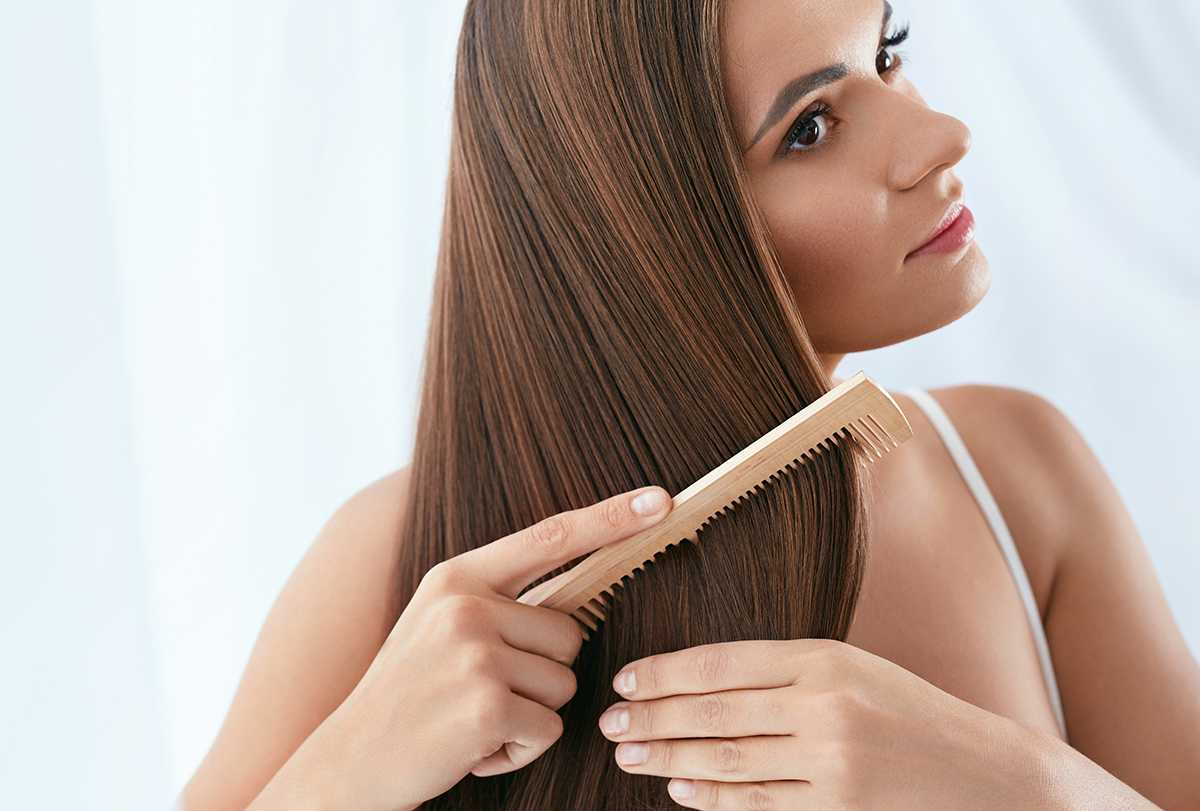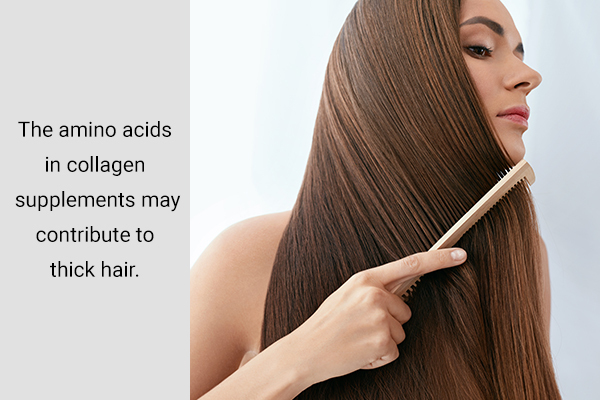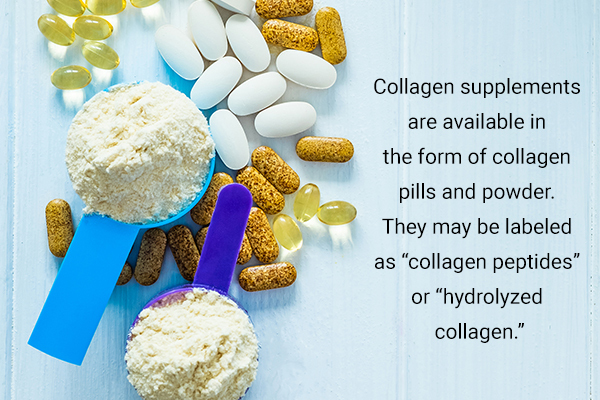In this article:
Collagen is the most abundant form of protein found in the body. These proteins help provide structural support to the bones, muscles, skin, and even cartilage. (1)(2)

Collagen proteins have a fibrous structure and help make the body tissues strong and resistant to damage. As you grow older, collagen levels in the body decrease, leading to weaker bones and saggy skin.
Hence, collagen supplements, designed to increase the levels of this protein in your body, have started making waves in the beauty industry. Some sources claim that taking collagen supplements regularly can improve the health of your hair and skin exponentially. (3)(4)
Read on to take an in-depth look at what collagen is and whether it can be beneficial for your hair.
Types of Collagen: There are a total of 28 types of collagen proteins found in the human body. Out of these, the five most abundant proteins are: (5)
- Type I collagen
- Type II collagen
- Type III collagen
- Type V collagen
- Type X collagen
These form the major building blocks of connective tissues all over the body.
How Does Collagen Help in Hair Thickness?

- Amino acids, which are the building blocks of protein and collagen, are protein in nature; thus, the amino acids in collagen supplements may contribute to thick hair. Collagen is a type of protein and is hence composed of amino acids. The two main amino acids in collagen are proline and glycine. Keratin, the major protein component of hair, is also mostly made up of proline. Thus, when you take collagen supplements, your body breaks them down into their building blocks – amino acids. These amino acids can be used to increase keratin production to promote hair growth.
- The body produces less collagen as you age, and this may cause changes in hair density and hair thickness. Older people have lower levels of collagen production in their body. This may contribute to weak bones, wrinkled and saggy skin, and age-related hair loss. In such cases, taking collagen supplements may be beneficial for hair thickness. (6) One of the most popular collagen supplements is shark extract supplements. Shark extract contains collagen and other fibrous materials that are good for the skin, hair, and bones. A 2020 study showed the efficacy of shark extract and other collagen supplements in decreasing hair loss. (7) The study described the use of Nutrafol hair supplements in women suffering from hair loss. Nutrafol contains collagen along with several other ingredients and was shown to be effective in increasing hair growth. As known, collagen does not directly help in hair growth but it may induce it indirectly. Collagen supplements can help improve the health of your hair follicles as well as provide the necessary amino acids for hair growth. However, more research is needed in this area to determine the exact role of collagen in hair production.
Should I Use Collagen for Hair Growth?
There is no specific scientific evidence that may show the benefits of collagen supplements for hair growth. However, anecdotal evidence for this phenomenon is plenty.
Some dermatologists recommend consuming a protein-rich diet over taking collagen supplements.
Note: Always make sure that the collagen supplements you take are genuine and from a trustworthy company or source. As collagen supplements do not fall under any FDA regulations, they can be easily tampered with.
Science Theories Between Collagen and the Hair Growth Process
Collagen protein may contribute to the formation of keratin protein, the main component of hair.
While collagen itself is not directly involved in hair growth or proliferation, some theories suggest that consuming collagen supplements may help indirectly increase the keratin levels in your hair. However, more research is needed to provide evidence for this claim.
On the other hand, there are a few scientifically proven factors that may explain how collagen consumption increases hair growth.
For instance, the human hair follicle is an opening on the surface of the scalp from which the hair grows. (6) The dermal layer of the hair follicle is made of three collagen layers. (8) Thus, collagen contributes indirectly to hair growth, and consumption of it may increase hair thickness and strength.
Which Collagen Type Contributes to Growth?
A recent study conducted on mice indicated that collagen VI may play an important role in promoting hair growth and thickness. (9)
In What Form Does Collagen Come on the Market?

Collagen supplements are available in the form of collagen pills and powder. They may be labeled as “collagen peptides” or “hydrolyzed collagen.”
Can Collagen Be Consumed?
Eating collagen directly may be beneficial for the hair. However, there isn’t any research proving it.
When digested via the stomach, collagen is broken down into its structural amino acids. These are later used by the body to promote healthy skin, bones, muscles, and maybe even hair.
Which Collagen Is Best for the Hair?
Marine collagen (such as shark extract) is known to be especially beneficial for the body. (1)(10) It may also help reduce hair fall and increase hair strength.
Diet Intake to Increase Collagen Naturally

You can increase collagen consumption in your diet by taking these naturally collagen-rich foods: (11)
- Seafood (especially fish): Seafood can increase collagen levels in the body. Most of the collagen is stored in fish bones and skin.
- Eggs: Egg whites contain high amounts of collagen and various other proteins that help increase hair growth.
- Organ meat: Type I collagen is mostly found in the organs of an animal. Eating kidneys and liver and gnawing on bones may help increase collagen levels in your body.
- Citrus fruits: Citrus fruits are rich in vitamin C, which is required to produce collagen.
- Chicken with skin: Chicken is rich in collagen and other types of protein.
- Berries: Berries are abundant in vitamin C and can indirectly increase collagen production.
- Tomatoes, avocados, bell peppers: These fruits and vegetables may help increase collagen content in the body.
- Aloe vera juice: Aloe vera juice has been shown to increase collagen production in the body in various research experiments. (12)(13)
Side Effects and Downside of Collagen Supplements
Collagen is a natural ingredient, and its side effects are rare. However, in certain cases, fish extract collagen may cause allergic reactions and even anaphylactic shock. (14)(15)
Thus, make sure you are not allergic to the product before consuming it. Moreover, collagen supplements are not regulated by the USFDA and hence should be bought from a trusted source.
What Are Collagen Peptides?
Collagen peptides are a form of collagen made from fish or cow protein extracts. It is a low-molecular-weight peptide that is easy to absorb by the body. (16)
Does Topical Collagen Work?
No. Topical collagen is ineffective when applied to the scalp. Collagen molecules are large and cannot be absorbed by the skin. Thus, shampoos and serums containing collagen have little to no effect on increasing hair growth.
Final Word
Collagen is necessary for the skin, bones, and muscles. While more research is needed to prove its role in hair growth, anecdotal evidence of collagen supplements increasing hair growth is aplenty.
- Was this article helpful?
- YES, THANKS!NOT REALLY


